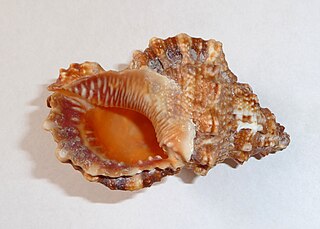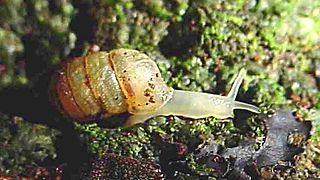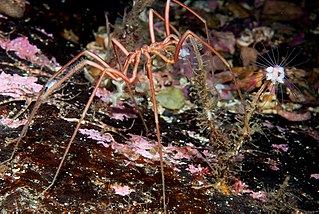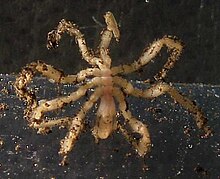
Sea spiders are marine arthropods of the order Pantopoda, belonging to the class Pycnogonida, hence they are also called pycnogonids. They are cosmopolitan, found in oceans around the world. The over 1,300 known species have leg spans ranging from 1 mm (0.04 in) to over 70 cm (2.3 ft). Most are toward the smaller end of this range in relatively shallow depths; however, they can grow to be quite large in Antarctic and deep waters.

The banded palm civet, also called the banded civet, is a viverrid native to Indomalaya. It inhabits primarily lowland conifer habitat, which is under threat from encroaching human activity. It is estimated the population of the banded palm civet has decreased by around 30% in just three generations. Banded palm civets are usually approximately the size of a domestic cat; their fur is pale but with dark bands on the back.

The Buccinidae are a very large and diverse taxonomic family of large sea snails, often known as whelks or true whelks.

Amphipyrinae is a subfamily of owlet moths in the family Noctuidae. There are more than 50 genera and 210 described species in Amphipyrinae, although the classifications are likely to change over time.

Triviidae is a taxonomic family of small sea snails, marine gastropod molluscs in the superfamily Cypraeoidea of the order Littorinimorpha.

Hadenini is a tribe of cutworm or dart moths in the family Noctuidae. There are more than 140 genera and 1,000 described species in Hadenini, found worldwide.

The Bursidae, common name "frog snails" or "frog shells", are a rather small taxonomic family of large sea snails, marine gastropod predatory snails in the clade Littorinimorpha.

Helicella is a genus of small to medium-sized, air-breathing land snails, terrestrial pulmonate gastropod mollusks in the subfamily Helicellinae of the family Geomitridae, the hairy snails and their allies.
Pupina is a genus of land snails with an operculum, terrestrial gastropod mollusks in the subfamily Pupillinae of the family Pupinidae.

Streptaxidae is a family of carnivorous air-breathing land snails, terrestrial pulmonate gastropod mollusks in the clade Stylommatophora. Six Streptaxidae subfamilies are accepted in the 2005 taxonomy of the Gastropoda by Bouchet & Rocroi.

The Hemigalinae are a subfamily of the viverrids denominated and first described by John Edward Gray in 1864. Hemigalinae species are native to Southeast Asia from southern China through Indochina, Malay Peninsula to Sumatra, Borneo and Sulawesi.

Nymphon is a genus of sea spiders in the family Nymphonidae. The species of sea spiders within the genus Nymphon are all benthic organisms and are found in abyssal and bathyal areas of the ocean. This is a fully marine group and can be found at various depths ranging from the littoral zones to the deep sea. They are found in most major oceans across the globe with a strong distribution around polar regions: Arctic and Antarctic waters. Out of the sea spider genus, Nymphon is the most rich, with a majority of the species within the genis being found in the Southern Ocean region. This genus may also contain bioluminescent species.

Pycnogonum is a genus of sea spiders in the family Pycnogonidae. It is the type genus of the family.

Achelia is a genus of pycnogonids in the family Ammotheidae.

Tanystylum is a genus of pycnogonids in the family Ammotheidae.

Coelidiinae is a subfamily of leafhoppers in the family Cicadellidae. There are at least 8 tribes, 108 genera, and over 900 species in Coelidiinae.

Callipallene is a genus of sea spiders in the family Callipallenidae. There are more than 30 described species in Callipallene.



















